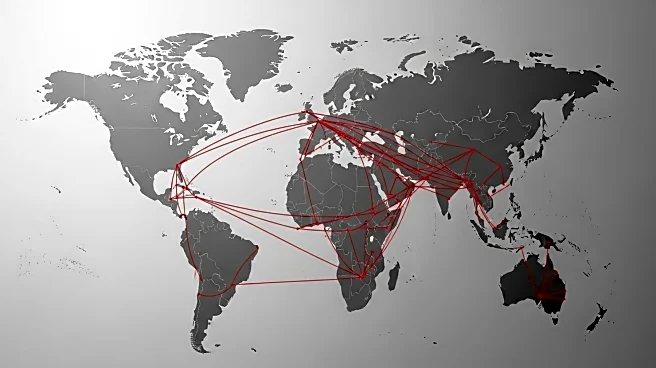What is the story about?
What's Happening?
The Trump administration has ended the tariff exemption for low-cost imports, leading to a significant decrease in postal traffic to the United States. The Universal Postal Union (UPU) reported that postal traffic plunged by more than 80% following the elimination of the 'de minimis exemption' for parcels valued at $800 or less. This exemption previously allowed lower-value parcels to enter the U.S. without customs charges. The new rules, implemented on August 29, 2025, require transportation carriers or U.S. Customs and Border Protection-approved parties to collect and remit customs duties. As a result, 88 postal operators have suspended some or all services to the U.S. until a solution is found. The UPU noted that the global network saw a near-halt in postal traffic to the U.S. due to operational disruptions, as carriers are unwilling or unable to collect the duties.
Why It's Important?
The removal of the tariff exemption is significant as it impacts international trade and postal services. The exemption, in place since 1938, was seen as a loophole exploited by foreign businesses to avoid tariffs and by criminals to smuggle drugs into the U.S. The change affects products from all countries, potentially increasing costs for U.S. consumers and businesses relying on imported goods. The decision may also strain international relations, as foreign postal operators struggle to comply with the new requirements. U.S. residents, however, are exempt from duties on incoming gifts valued up to $100 and personal souvenirs up to $200 from abroad.
What's Next?
The UPU is working on measures to help postal operators calculate and collect duties, but the lack of time and guidance for compliance remains a challenge. The Trump administration's executive order, signed on July 30, 2025, outlines the procedures for eliminating duty-free eligibility, but further adjustments may be needed to address the operational disruptions. Stakeholders, including postal operators and international trade partners, may seek negotiations or policy revisions to mitigate the impact on global postal services.
Beyond the Headlines
The decision to end the tariff exemption raises ethical and legal questions about trade fairness and the balance between national security and economic openness. It may lead to long-term shifts in international trade practices and postal service operations, as countries adapt to new U.S. import regulations. The move could also influence future U.S. trade policies and negotiations, as the administration seeks to close loopholes and enhance border security.















